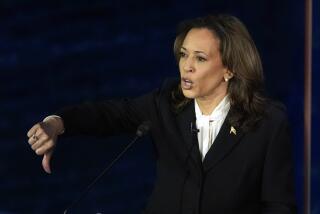Bush, on Polish TV, Hails Solidarity, Human Rights
- Share via
WARSAW — Vice President George Bush spoke on Polish national television here Monday, invoking the name of Solidarity and suggesting to Poles that progress for their country lies in the direction of “respect for human rights” and the “right to form independent and self-governing organizations.”
As his Polish television hosts pointed out, it was the first time an American vice president had spoken on the state-controlled news broadcast, and Bush was careful in his remarks to give equal time to his meetings with Poland’s leader, Gen. Wojciech Jaruzelski, and other government officials. Nevertheless, his reference to Lech Walesa marked one of the rare mentions of the Solidarity leader’s name on national television.
It was in Walesa’s company that Bush began his day here, visiting an important Solidarity shrine, the churchyard grave of Father Jerzy Popieluszko, the Roman Catholic priest who was slain in 1984 by Polish secret policemen.
Wreath-Laying Ceremony
Walesa joined Bush in laying a wreath on the grave as about 3,000 spectators lined the streets around the church, in a residential section of Warsaw, chanting Solidarity slogans and waving American flags.
After touring the church, Bush stood on a balcony, Walesa at his side, and spoke briefly to the crowd.
“I’m proud to be standing next to Lech Walesa, a man so respected in the United States of America,” the vice president said. “. . . We join you in pledging that Father Popieluszko did not die in vain.”
As are many of the events surrounding Solidarity activities at the church, it was a striking scene and provided a camera crew, accumulating footage that may be used later in television commercials for George Bush, presidential candidate, its most dramatic film of the trip so far. Bush plans to announce his candidacy on Oct. 12.
In his television appearance, Bush’s words in English were barely audible in the background as an interpreter translated his remarks into Polish instantly and accurately. Bush spoke from a desk on the set from which the evening news is normally broadcast here.
“In the past three days, I have had candid and useful meetings with Chairman Jaruzelski and other leaders of your government,” he said. “We signed an important agreement on cooperation in science and technology.
“I also met with Cardinal (Jozef) Glemp, with leaders of independent thought and with Lech Walesa and other leaders of Solidarity.
“Much mutual suspicion and bitterness remain from the events of December, 1981,” Bush said, referring to the declaration of martial law here and the suspension of Solidarity, which was eventually banned.
Bush added that it is up to Poles to decide what road to take, “but I can tell you what has worked in our country and in many other countries. It is respect for human rights. It is the right to form independent and self-governing organizations for many purposes, including the protection of workers’ interests. It is an economic system that encourages people to reach their full potential.”
A Polish news commentator, who spoke immediately after the vice president’s five-minute talk, said that although Bush had come to Poland to look behind “the myths and illusions,” it was clear “from his remarks that he didn’t get rid of all his myths and illusions.”
Most of Bush’s message, however, focused on relations between the United States and Poland, which he thanked for a warm reception during his visit, ending today. The ties between Americans and Poles, he said, are “not weakened by the differences between our governments.”
He went on: “Everyone recognizes these last few years have been difficult ones in Poland. We in America have watched and suffered with you. As you have so often in the past, you have endured with courage, faith and determination.”
After his departure from Poland today, Bush travels to Bonn, Paris, London and Brussels.
More to Read
Get the L.A. Times Politics newsletter
Deeply reported insights into legislation, politics and policy from Sacramento, Washington and beyond. In your inbox three times per week.
You may occasionally receive promotional content from the Los Angeles Times.










